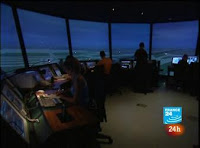Spanish military takes over airspace following controller walkout
Spain’s military was forced to take control of the country’s national airspace Friday after a mass industrial action that left some 330,000 travellers stranded and was expected to cause a national emergency Saturday if continued.
Spain’s military took control of the nation’s airspace Friday night after air traffic controllers staged a massive sickout that stranded at least 330,000 travelers on the eve of a long holiday weekend, forcing the government to shut down Madrid’s big international hub and seven other airports.
About six hours after the nation descended into total travel chaos, Deputy Prime Minister Alfredo Perez Rubalcaba announced that the Defense Ministry had “taken control of air traffic in all the national territory.” He said the army would make all decisions on air traffic control, organization, planning and supervision.
If enough controllers do not show up for work Saturday to restore normal flight operations, Prime Minister Jose Luis Rodriguez Zapatero plans to declare a national emergency that would force them to do so, Rubalcaba said. No-show controllers will face unspecified criminal charges punishable by “serious prison time,” he said.
Spanish flagship carrier Iberia SA said all of its flights in and out of Madrid were suspended until at least 11 a.m. Saturday, but other airlines did not give guidance for when flights might resume.
The controllers abandoned their posts amid a lengthy dispute over working conditions and after Zapatero and his ministers on Friday approved a package of austerity measures - including a move to partially privatize airports and hand over management of the Madrid and Barcelona airports to the private sector.
Angry passengers waited in huge lines for hours until giving up when it became clear their flights would not depart. Air traffic controllers meeting to plot strategy at a hotel near Madrid’s airport were heckled and filmed by stranded passengers as the controllers entered.
“To the unemployment line with you all!” one man yelled at the controllers, in footage shown by Spanish National Television.
Handfuls of passengers made it out of Madrid to destinations like Barcelona and Lisbon, Portugal, on buses provided by airlines. But the vast majority were forced to go home or to hotels with no information on when they might make their canceled flights. Some slept in the airports.
“It’s a disgrace, how can a group of people be so selfish as to wreck the plans of so many people?” said dentist Marcela Vega, 35, unable to travel from Madrid to Chile with her husband, 5-year-old son and baby boy.
Spain’s airport authority, known as Aena, said authorities were in contact with Europe’s air traffic agency, Eurocontrol, and the United State’s FAA about how best to deal with arriving international flights.
Aena chief Juan Ignacio Lema called the sickout “intolerable” and warned controllers to return to work, or face disciplinary action or criminal charges.
“We’re asking the controllers to stop blackmailing the Spanish people,” Lema said.
Spain’s air traffic controllers have been in bitter negotiations for a year with state-owned Aena over wages, working conditions and privileges. The dispute intensified in February after the government restricted overtime, cutting the average annual pay of controllers from about 350,000€ ($463,610) to around 200,000€ ($264,920).
The sickout also closed four airports in the Canary islands off Africa’s coast, a favorite winter destination for sun-seeking Europeans, and airports in prime Mediterranean tourism spots of Ibiza, Palma de Mallorca and Menorca.
Spanish Development Minister Jose Blanco convened an emergency meeting and his ministry announced that “controllers have begun to communicate their incapacity to continue offering their services, abandoning their places of work.” Blanco later told reporters that authorities were forced to close airspace around Madrid for safety reasons.
“We won’t permit this blackmail that they are using to turn citizens into hostages,” Blanco said
The controllers’ union has complained for weeks that many members have already worked their maximum hours for all of 2010, and that all 2,000 are overworked and understaffed. Friday’s sickout was not expected, but the union had warned it could mount one over the Christmas holiday. Spanish air traffic controllers are prohibited by law from going on strike.
Aena said most controllers had left their workstations or never showed up, and that only 10 controllers remained on duty in Madrid to handle emergencies.
Some controllers began to return to work late Friday, including about half of the normal staff in Barcelona, where several flights took off by early Saturday. But Rubalcaba said the number of returning controllers was spotty, and that some who showed up refused to perform their duties.
Madrid’s sprawling Barajas airport was empty after midnight. It had 1,300 flights scheduled for Friday, but it wasn’t clear how many had taken off and landed before the sickout.
More than 5,000 flights were scheduled for the nation Friday, and about 3,000 departed or landed before the sickout began in the late afternoon.
Monday is a national holiday marking the Day of the Spanish Constitution, and Wednesday is a religious holiday. Many Spaniards take advantage of them for a five-day weekend or a week of vacation, and about 4 million people had flights booked for the period in the nation of 46 million.
Many of Spain’s famed football players were forced to head on trains and buses with their teams so they could make it to weekend games.
Source : http://www.france24.com/en/20101204-spain-military-control-airspace-strike-stranded-passangers-national-emergency




Comments
Post a Comment